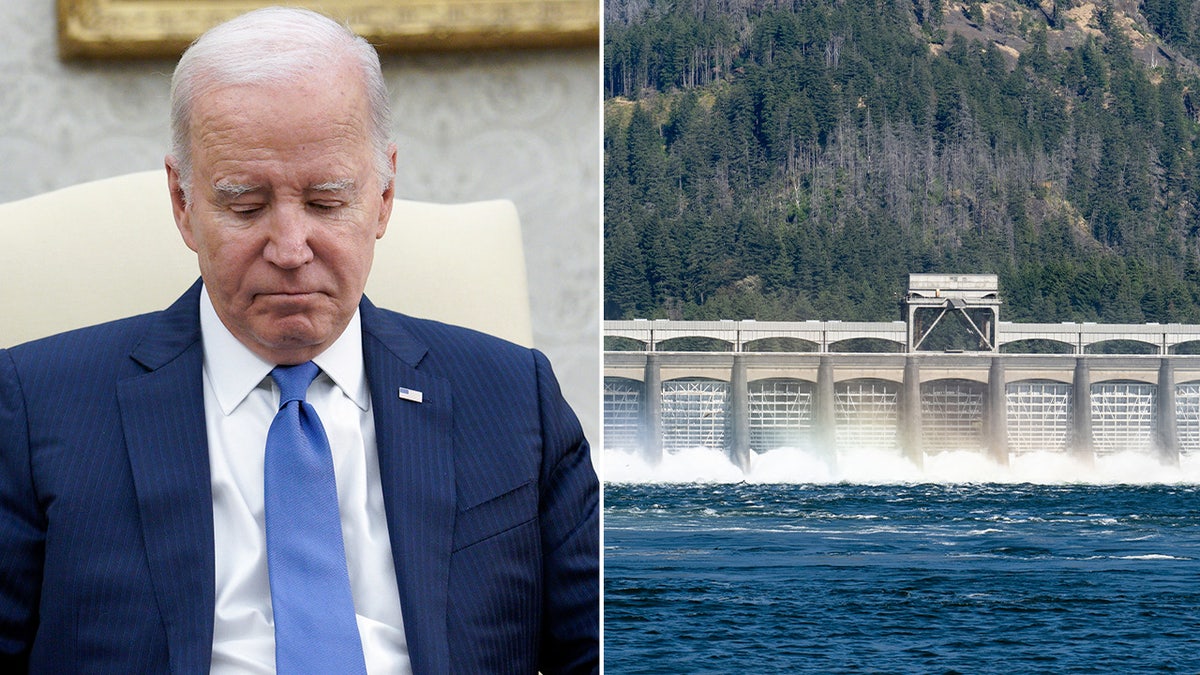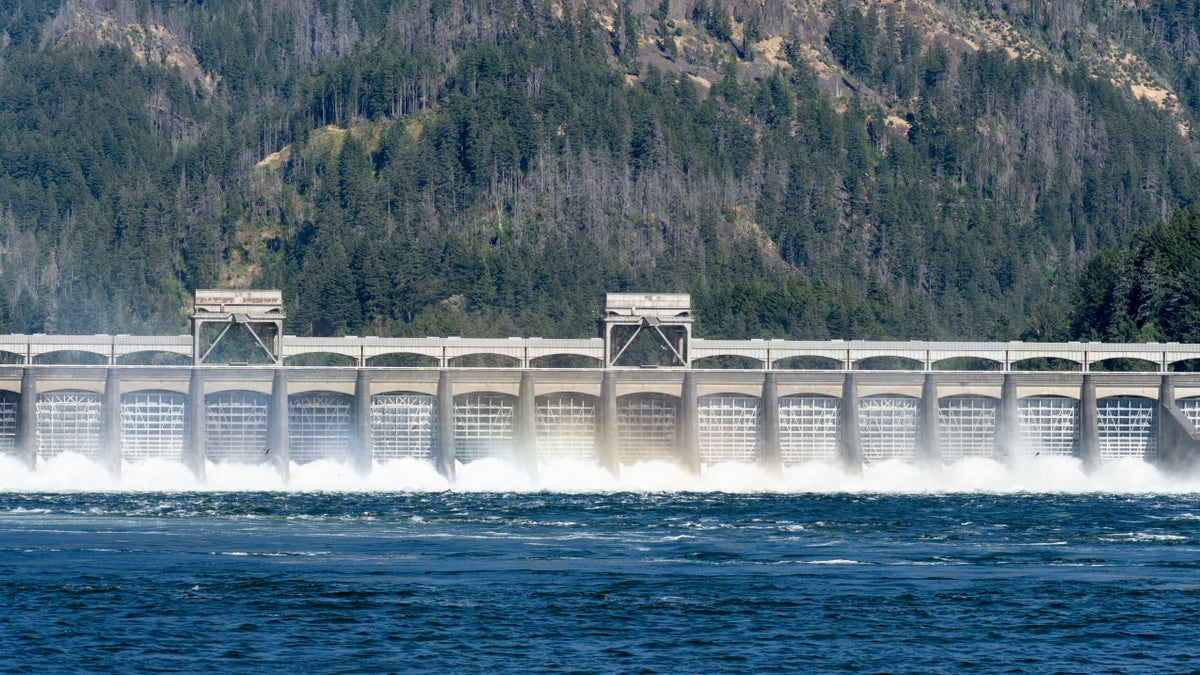The White House, in coordination with Native American tribes and environmental groups, announced actions Thursday that provide a pathway for breaching, or removing, four hydroelectric dams in Washington state to protect salmon.
As part of the announcement, the federal government entered into a legal agreement with the Pacific Northwest tribes and environmental organizations filed earlier in the day in the U.S. District Court for the District of Oregon. Under that agreement, the tribes and eco groups — which had sued the federal government in an effort to forcibly breach the dams — agreed to stay the litigation through 2028.
“President Biden understands that the Columbia River System is the lifeblood of the Pacific Northwest, and for the first time under his direction, federal agencies are putting all hands on deck to support regional and Tribal efforts to restore wild salmon in the region,” White House Council on Environmental Quality (CEQ) Chair Brenda Mallory said in a statement.
Mallory said the agreement charts a new path to restore the river. Environmental activists, Democrats and tribes have argued that the four federally-managed dams, which are located on the lower Snake River winding through Idaho and Washington before feeding into the Columbia River and Pacific Ocean, have decimated salmon and steelhead populations by blocking natural migratory patterns.
HOUSE PANEL TO PROBE BIDEN ADMIN’S NEGOTIATIONS WITH ECO GROUPS TRYING TO TEAR DOWN KEY POWER SOURCE
Council on Environmental Quality Chair Brenda Mallory speaks at a climate rally near the White House in Washington, D.C., on April 23, 2022. (Paul Morigi/Getty Images for Green New Deal Network)
“Today’s historic agreement marks a new direction for the Pacific Northwest,” added White House clean energy czar John Podesta. “Today, the Biden-Harris Administration and state and Tribal governments are agreeing to work together to protect salmon and other native fish, honor our obligations to Tribal nations, and recognize the important services the Columbia River System provides to the economy of the Pacific Northwest.”
Democratic Govs. Tina Kotek of Oregon and Jay Inslee of Washington; several involved tribes, including the Confederated Tribes of the Umatilla; and environmental groups like Earthjustice, which represented plaintiffs in the case, all applauded the agreement as an unprecedented path forward.
MAJOR US POWER SOURCE FACING EXTINCTION THANKS TO RED TAPE, SPARKING CALLS FOR REFORM
The agreement includes $1 billion for wild fish restoration and a plan to develop new clean energy power operated by tribes. And it further establishes the so-called Columbia Basin Restoration Initiative, which includes a “comprehensive new roadmap” for salmon recovery involving a call to replace the energy, transportation, irrigation and recreation services provided by the lower Snake River dams, so they can be breached, according to Earthjustice.
The initiative explicitly recommends that dams are breached within two fish generations, or approximately eight years. While there isn’t an explicit plan to breach the dams — an action that the White House has acknowledged would require congressional approval — the agreement does include commitments to begin replacing the services provided by the dams.

President Biden previously pledged to work with proponents of breaching the four lower Snake River dams to “bring healthy and abundant salmon runs back.” (Getty Images)
“Congress — and Congress alone — can authorize removal of the dams on the lower Snake River. Bureaucrats, activist litigation, nor this administration’s radical agenda will determine the fate of any of the Northwest’s federal dams,” Sen. Jim Risch, R-Idaho, said in a statement to Fox News Digital.
“This litigation effort was useless: It occurred behind closed doors, between two parties who wanted the same end result — to tear out our dams, and it completely excluded Idahoans who rely on the River System for its energy, transportation, agriculture and recreation benefits,” he continued. “I will continue to fight any breaching efforts, and, at every turn, I will reject the Biden administration’s efforts to usurp Congressional authority.”
Risch, other Republican lawmakers, power industry groups and agriculture groups have all loudly objected to any plan involving the breaching of the dams, pointing to their clean energy output and vital services providing passage for barges traveling along the river.
The dams were constructed in the 1960s and 1970s by the U.S. Army Corps of Engineers primarily to ensure the Snake River was passable for such barge transportation. However, since then, the main benefit has been their reliable clean energy output. They still provide about 8% of the state’s electricity, enough to serve millions of residents, and have a large total capacity of 3,000 megawatts.

A U.S. Army Corps of Engineers dam is shown in the Columbia River system in Washington state. (Marli Miller/UCG/Universal Images Group via Getty Images)
Removing the dams would also likely chip away at U.S. climate goals since their energy production would likely need to be replaced by fossil fuel alternatives. According to federal data, replacing hydropower generated by the dams with natural gas generation would increase carbon emissions by up to 2.6 million metric tons per year, the equivalent of 421,000 passenger cars.
In addition to the impacts on energy and climate ambitions, removing the four Snake River dams would harm agriculture exports. Aided by the dams, barges traveling along the Columbia River system carry about 60% of Washington’s annual wheat exports and a staggering 40% of the nation’s total wheat production.
CLICK HERE TO GET THE FOX NEWS APP
“Instead of working with all interests, the U.S. Government chose for months to hold secret negotiations and refused to share any details with us, let alone allow our participation,” the executive directors of Northwest RiverPartners, the Public Power Council and the Pacific Northwest Waterways Association, which collectively represent power utilities, ports, agriculture companies and other businesses dependent on the dams, said last month.
“It is not surprising, then, that this proposal turns its back on over three million electricity customers as well as the farming, transportation, navigation and economic needs of the region,” they continued. “By purposely excluding our respective organizations from the negotiations, literally millions of Northwest residents were deprived of fair representation in this process.”
That statement came after lawmakers, led by Rep. Cathy McMorris Rodgers, R-Wash., wrote to President Biden, calling for him to reject any agreement involving the breaching of dams. The letter included a leaked mediation document that paved the way for Thursday’s announcement.